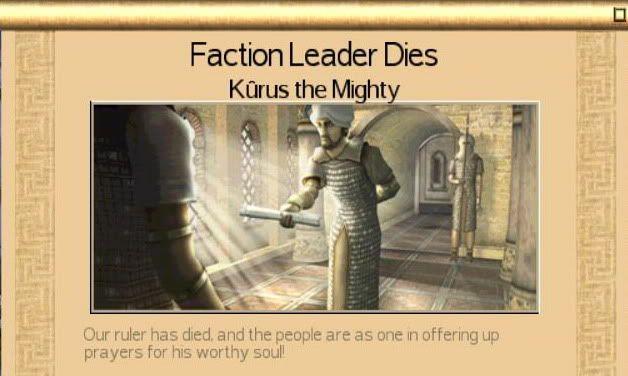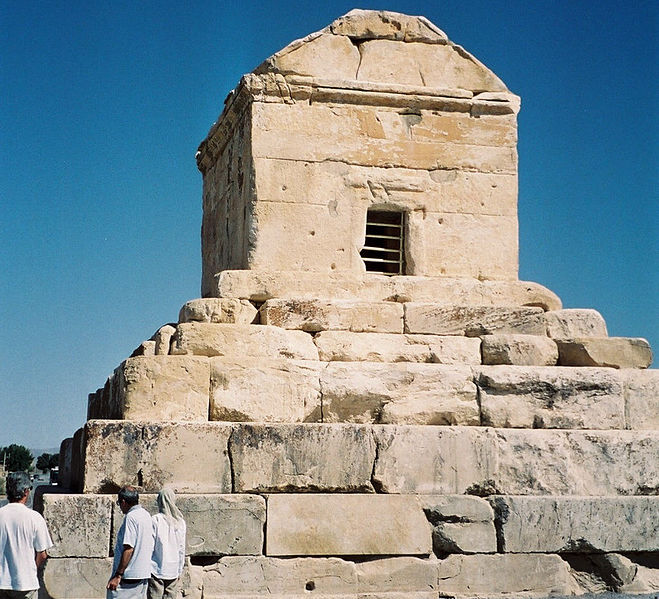On a large enough time line, the survival rate for everyone will drop to zero.
-Chuck Palahniuk
Death of Kûrus
Excerpt from “Life and Death of Kûrus” by Professor James Marshal, 1994 Chicago
With Damaskus in his hand Kûrus gained the Levant, thus enabling him sea trade in the Mediterranean. Sidon and Jerusalem acknowledged the Persian Empire and subdued to Kûrus. The next couple of years Kûrus spent his time quelling the last resisting cities that once belonged to the Neo-Babylonian Empire. During that time Darayawus, one of his best generals, started an attack on the Median empire. After some victories he got terribly beaten and killed by the Medians in 539BC, which ended the first try to expand into the Median territory[13]. Following defeat the Medians started invading the Persian Empire at Susim and Babylon. Kambûjiya, Kûrus' son, who was in command over Babylon would spent all his power to repel the Medians.
Who is James Marshal again?
Vidarna – History of Parsa (real title of the book is unknown)
(written at about 530-500 BC)
Book IX
[...]
7. It was the end of the Persian year and mighty and divine king Kûrus was spending the days at the city of Sidon. There he oversaw the rebuilding of the old Phoenician towns. He loved to spent his days at Sidon because Kûrus loved the sea and the fresh air. He was now 63 years old and yet he was of astounding health, he rode his beloved horse every day for hunting and spent an hour swimming because it made him healthy. But at the end of the year he suddenly fell terribly ill. His doctors came and did what they could. But Kûrus knew his time was coming. He said: "Auramazdā is calling me. Do not dwell on my death for I have lived long and accomplished much. I have done many good things and this is my our beloved god who made me strong and healthy is giving me a death without much suffering." He sent his doctors away, spoke to his generals and told them to aid his son in his upcoming rule. The next morning he passed away in peace, for Kûrus has reigned in the name of peace and brought it to those who wished him ill.

Cont. Excerpt from “Life and Death of Kûrus” by Professor James Marshal, 1994 Chicago
Kûrus had laid down the foundation to the Persian Empire. In 20 years he had fought and destroyed the whole Neo-Babylonian empire. His reign went over to his son without any internal troubles. Nevertheless the new King Kambûjiya faced a difficult situation for Demonsthenes tells us that the Empire was attacked on several fronts by the Medians.
With Kûrus not only a mighty military leader died, but also the historic written sources disappeared. Demonsthenes is the only source who retells parts of the Persian history after Kûrus and he leaves out certain years. The conquest of Media by the Persians remains obscure and only vague details can be reconstructed.
Over all Kûrus was a potent military genius. I have tried to draw certain lines between Alexander and him in this book because one gave birth to the Persian empire in a few years and the other one destroyed it fulminatly. Nevertheless Kûrus was not Alexander. Kûrus led simple warriors to conquered a professional army, while Alexander already had a professional army. But Kûrus was not without flaws. As Sargot demonstrated in his works, Kûrus was financial inapt, his empire was not structured well and he lost much money due to corruption and weak taxation. It took his son to reform the system.
All in all Kûrus was a devout man who believed in his own principles. His liberal ideas, like freeing the Jews from the Babylonians, made Sargot give him the title of the "first humanist of the world". I couldn't agree more.

Tomb of Kûrus, Iran









 Reply With Quote
Reply With Quote
Bookmarks